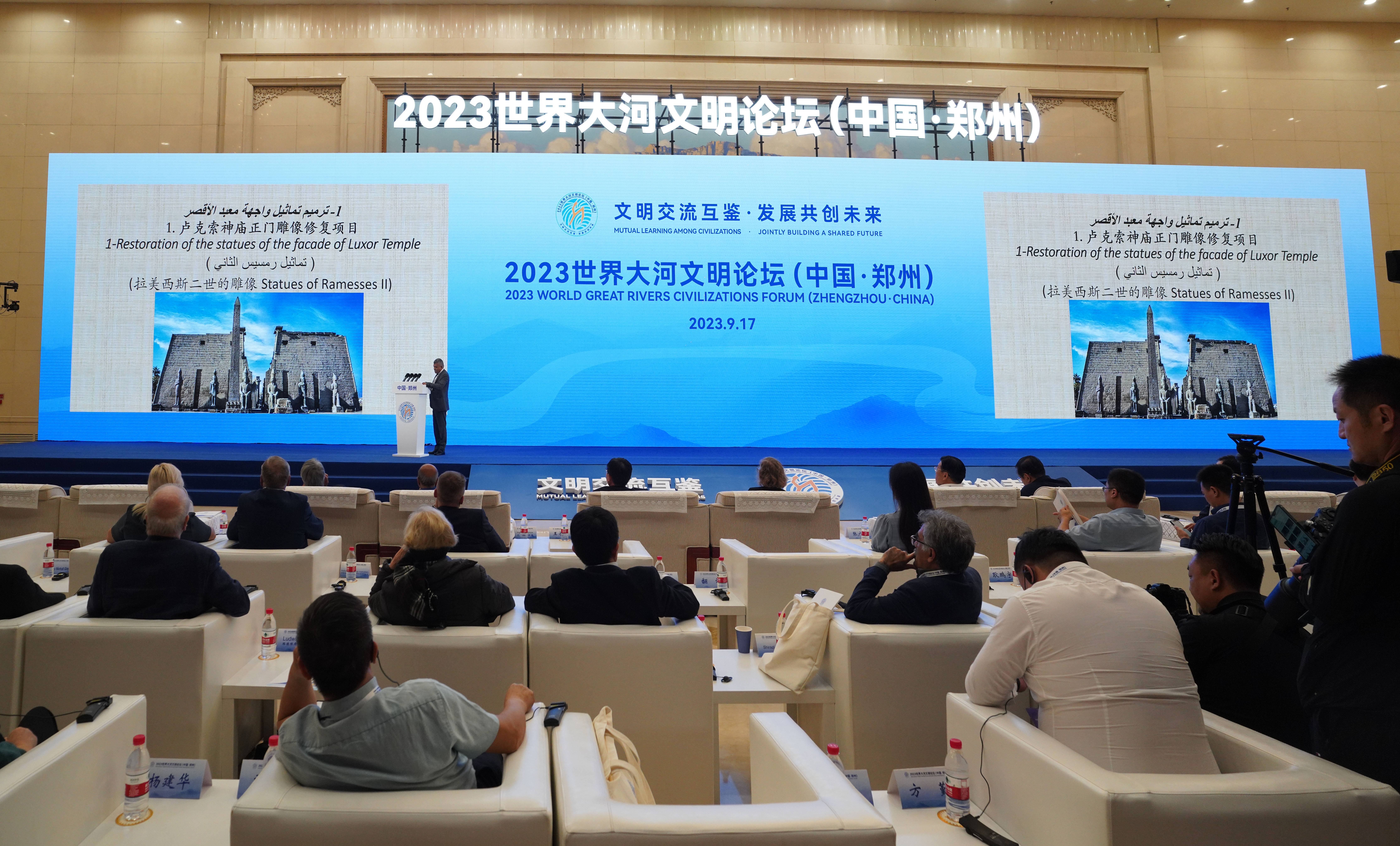河·和·合——透视《世界大河文明论坛·郑州宣言》
河·和·合——透视《世界大河文明论坛·郑州宣言》
■河南日报客户端记者 张建新 王延辉
大河奔腾天地间,文明绵延古今传。金秋九月,地处黄河之滨的国家中心城市——郑州,迎来了一场文明交流互鉴的盛会。
9月17日,2023世界大河文明论坛在郑州举办,来自世界各地的300余位与会专家学者围绕“文明交流互鉴·发展共创未来”主题深入交流,共同探讨世界大河文明与人类未来,达成一致共识。

九月,一个特殊的月份。四年前,习近平总书记在郑州主持召开座谈会,把黄河流域生态保护和高质量发展上升为重大国家战略,发出了“让黄河成为造福人民的幸福河”的时代号召,并强调“要深入挖掘黄河文化蕴含的时代价值,讲好‘黄河故事’,延续历史文脉,坚定文化自信,为实现中华民族伟大复兴的中国梦凝聚精神力量。”
九月,一个收获的季节。黄河两岸,硕果飘香,而在文明的交流互鉴中,一份沉甸甸的“果实”——《世界大河文明论坛·郑州宣言》(下称《郑州宣言》)也应运而生。

为什么是河南?为什么在郑州?
不久前,一场在北京召开的新闻发布会“开宗明义”:在河南郑州举办首届世界大河文明论坛,搭建弘扬黄河文化的重要平台、促进大河流域文明交流互鉴的重要纽带,加强同世界各地的文化交流,共同践行全球文明倡议、推动文化繁荣发展,为建设中华民族现代文明、推动构建人类命运共同体贡献力量。
大河奔流,文明潮涌!河流是人类文明的摇篮。“黄河-长江流域、印度河流域、两河流域、尼罗河流域分别孕育了中华文明、古印度文明、古巴比伦文明、古埃及文明。”中国考古学会理事长王巍说,“大河孕育了农业,农业的发展为文明的起源、形成与发展奠定了基础;各文明之间的交流互鉴促进了人类文明的共同发展。每一种文明在其发展过程中都留下了独一无二的历史和文化,形成了丰富多彩的人类文明百花园。”

黄河是中华民族的母亲河,黄河文化是中华民族的根和魂。河南是黄河文化核心区,承载中华文化主根主脉,在赓续中华文明、推动传承发展上承担重要使命。郑州则是中华文明起源、形成与发展的关键区域,是我国百万年人类史、一万年文化史、八千年农业史、五千多年文明史、四千年建都史、三千六百年建城史的主要实证地之一。
追溯各个国家的文明起源,绕不开“河”;促进各个文明的交流互鉴,离不开“和”;推动互利合作、融合发展,撇不开“合”。
《郑州宣言》就是以“河”为纽带,注重和而不同、和谐共处,促进和合共生、合力发展。
在文明对话中,《郑州宣言》形成了哪些共识?翻看《郑州宣言》,九项内容引人注目。
“大河孕育了世界主要文明,是人类文明的具象化,是人类文明交流互鉴的动力、携手合作的纽带。”
“大河流域承载着人类文明的基因。”
“倡议尊重各大河流域的文明特性,维护人类文明多样性。”
“倡议采取有力措施,保护好大河流域的文化遗产。”
“倡议加强对包括大河文明在内的世界文明的研究。”
“倡议加强对文明的传承和弘扬。”
“倡议保护大河流域的生态环境,实现文明和生态和谐共生。”
“倡议发挥古代文明的时代价值,促进人类社会现代文明发展。”
“倡议加强文明交流互鉴,实现人文交流、文化交融、民心相通。”
《郑州宣言》最后庄严宣告:在重视文明传承和创新,充分挖掘各国历史文化的时代价值,推动各国优秀传统文化创造性转化、创新性发展的过程中,我们要尊重世界文明多样性,坚持文明平等、互鉴、对话、包容,以文明交流超越文明隔阂、文明互鉴超越文明冲突、文明包容超越文明优越。我们应搭建与各国人文交流合作的桥梁,共同推动人类文明在互鉴中绽放光彩,共享发展机遇、共创美好未来。

“虽在郑州,但关照的是世界。此次论坛是首次就世界大河流域文明起源发展等进行研讨交流的国际论坛,《郑州宣言》注重国际视野,其内容之广,其意义之远,体现了中华民族一贯的开放胸怀,尊重的是世界文明的多样性,扩大的是中华文化的国际影响力。”王巍深有感触地说。
“《郑州宣言》的站位是全世界、全人类的高度,有助于提升大家对文明的认知、思考文明与现代的关系,从古文明中汲取智慧和力量,为不断丰富和发展人类文明新形态作出贡献。”河南大学黄河文明与可持续发展研究中心副主任、黄河文化遗产实验室副主任侯卫东说。
参加会议的专家学者对论坛的会标饶有兴致。底色是蓝色指纹,蕴藏着人类基因的密码;中间的“河”字是甲骨文,我国最早的成熟文字,两者有机融合,体现了河流与文明的关系,也传递着“文明交流互鉴·发展共创未来”的美好寓意。
黄河潮起,走向全国,走向世界。由世界大河文明论坛出发,向世界发声。和而不同、美美与共,文明互鉴之光必将照亮发展新路。
《世界大河文明论坛·郑州宣言》
2023世界大河文明论坛于9月17日至18日,在中国黄河中游的国家中心城市、八大古都之一的郑州举办。来自世界各地的300余位与会专家学者围绕“文明交流互鉴·发展共创未来”进行了广泛深入地探讨,并达成以下共识:
一、大河孕育了世界主要文明,是人类文明的具象化。大河奔流不息,象征着文明绵延不绝;大河一往无前,代表了人类创新前行;大河汇聚众川,体现了人类文化的开放包容;大河连接不同区域,为不同肤色、语言的人群搭建起友谊的桥梁,是激发人类文明进步的源头活水。大河,是人类文明交流互鉴的动力、携手合作的纽带。
二、大河流域承载着人类文明的基因。黄河-长江流域、印度河流域、两河流域、尼罗河流域分别孕育了中华文明、古印度文明、古巴比伦文明、古埃及文明。这些文明各有所长,都为人类文明的进步做出了巨大贡献。文明的足迹沿着大河的脉络走来,一部分成为陈列在广阔大地上的永恒遗产,一部分在交流互鉴中变得更为璀璨。
三、倡议尊重各大河流域的文明特性,维护人类文明多样性。世界大河流域的环境各不相同、文明的面貌各具特色,构成绚丽多彩的世界文明百花园。各个文明尽管起源时间有早晚、延续时间有长短之分,但并无高下优劣之别。应当尊重世界各个国家、各个民族创造的文明,保护文明的多样性。
四、倡议采取有力措施,保护好大河流域的文化遗产。大河流域的文化遗产,是世界文明的重要组成部分。在世界城市化进程中,很多文化遗产受到威胁,甚至消失,亟待全人类携手应对,采取有力措施,加强对人类文化遗产的保护。
五、倡议加强对包括大河文明在内的世界文明的研究。搭建文明探源、文明交流、文化遗产保护利用全球性学术研究交流平台,深化对人类文明起源、形成、发展的历史脉络研究。
六、倡议加强对文明的传承和弘扬。要让收藏在博物馆里的文物、陈列在广阔大地上的遗产、书写在古籍里的文字都活起来,让人类文明焕发出新的活力和魅力。
七、倡议保护大河流域的生态环境,实现文明和生态和谐共生。纵观人类文明发展史,生态优良、环境宜人的大河流域孕育了众多文明古国。传承文明,既要尊重历史,也要敬畏自然。我们应站在人与自然和谐共生的高度谋划大河流域的发展。
八、倡议发挥古代文明的时代价值,促进人类社会现代文明发展。古代文明是人类智慧和经验的重要承载,对人类社会的历史贡献和时代意义不容忽视。四个大河流域古文明虽然有些未曾延续至今,但它们是后来诸多文明的源头。今天,我们更应重视发挥古代文明的时代价值,为人类现代文明进步事业作出新的更大贡献。
九、倡议加强文明交流互鉴,实现人文交流、文化交融、民心相通。在重视文明传承和创新,充分挖掘各国历史文化的时代价值,推动各国优秀传统文化创造性转化、创新性发展的过程中,我们要尊重世界文明多样性,坚持文明平等、互鉴、对话、包容,以文明交流超越文明隔阂、文明互鉴超越文明冲突、文明包容超越文明优越。我们应搭建与各国人文交流合作的桥梁,共同推动人类文明在互鉴中绽放光彩,共享发展机遇、共创美好未来。
2023世界大河文明论坛(中国·郑州)
2023年9月17日
World Great RiversCivilizationsForum
Zhengzhou Manifesto
The 2023 World Great RiversCivilizationsForum was held from September 17th to 18th in the city of Zhengzhou, which is a national central city and one of the eight GreatAncient Chinese Capitals sited along the Yellow River. More than 300 experts and scholars from all over the world gathered to engage inand conductedextensive and in-depth discussions onthe theme of "Mutual Learning Among Civilizations·Jointly Building AShared Future", and have reached the following consensus:
1. Great Rivers have nurtured the world’s major civilizations and are the embodimentof human civilizations. The perpetualflow of rivers symbolizes the continuity of civilizations, and their unstoppable force signifies human innovation and progress. The convergence of various streams reflects the openness and inclusivenessof human culture. Rivers connect different regions, bridgingfriendship betweenpeople of different races and languages, and serving as the source of inspiration for the advancement of human civilization. Rivers are the driving force for communication and the link for mutualunderstanding among human civilizations.
2. Great River basins carry genetic heritages of human civilizations.The Yellow River - Yangtze River basin, the Indus River basin, the Tigris and Euphrates River basin, and the Nile River basin have respectively nurtured Chinese civilization, ancient Indian civilization, ancient Babylonian civilization, and ancient Egyptian civilization. Each of these civilizations has its strengthsand has made significant contributions to the progress of human civilization. The footprints of civilizationsfollow theveins of rivers, with some becoming eternal legaciesdisplayedon the vast earth, whileothers shining even brighter through communication and mutual learning.
3. Advocate for respecting the civilizationalcharacteristics of each river civilization to safeguard the diversity of human civilizations. Themajor river basins of the world have different environments and distinctive civilizational features, constitutinga colorful global garden of civilizations. Although civilizations have originated earlier or later, lasted longer or shorter, there is nosuperior or inferior among them. We should respect civilizations created byall countries and peoples of the worldand protect the diversity of cultures.
4. Advocate for taking strong measures to protect cultural heritages of river basins. The cultural heritages of river basins represent an essential part of world civilization. Many culturalheritages are beingthreatened or disappeared in the process of urbanization in the world. It is urgent for the whole humanity to join hands to deal with the situationand take strong measures to enhance the protection of human cultural heritages.
5. Advocate for intensified research on global civilizations including river civilizations. A global academic research and exchange platform should be set up for the exploration of civilizations, civilization exchanges and the protection and utilization of cultural heritages, deepening research on the historical context of the origin, formation, and development of human civilization.
6. Advocate for enhancing the inheritance and promotion of civilization. Artifacts in museums, heritage displayed on the vast land, and ancient texts should be brought to life,so that human civilization can be revitalized with new vigor and vitality.
7. Advocate for protecting the ecological environment of river basins and to achieve a harmonious coexistence of civilization and ecology. Throughout the history of human civilization, river basins with favorable ecology and pleasant environments have nurtured a number of ancient civilizations. To inherit civilization demands us not only respect historyas well asnature. We should plan forthe development of river basins from the perspective of harmonious coexistence between humans and nature.
8. Advocate for utilizing the modern values of ancient civilizations to promote the development of modern civilization of human society.Ancient civilizations are important bearersof human wisdom and experience, and their historical contributions as well as modern significance should not be underestimated. Although some of the four major ancient river basin civilizations have not survived to the presentday, they are the sources of many subsequent civilizations. Today, we should pay more attention to the contemporary relevance of ancient civilizations and make new and greater contributions to the progress of modern human civilization.
9. Advocate for strengthening civilization communication to achieve cultural exchanges, integration and mutual understanding.Inthe process ofemphasizingthe civilizational inheritance and innovation, fully tapping into the historical and cultural values of various countries, and promoting the creative transformation and innovative development of outstanding traditional cultures, we should respect the diversity of world civilizations, and adhere to the principles of equality, mutual appreciation, communication, and inclusiveness among civilizations.Cultural exchanges will transcend estrangement, mutual learning will transcend clashes, and inclusiveness will transcend feelings of superiority. We should build bridges for people to people exchanges and cooperation among different countries and jointly promote the human civilization to blossom inmutual learning, sharing development opportunities, and creating a better future together.
2023 WorldGreatRiversCivilizationsForum (Zhengzhou, China)
September 17, 2023
